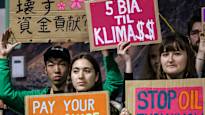The controversial issue of the Baku climate meeting, i.e. the amount of climate finance, depends on how quickly emissions decrease, writes environmental reporter Hanna Eskonen.
Hanna Eskonen environmental reporter
– I came here to tell you that climate change kills, said the prime minister of a country at the climate conference in Baku.
The minister spoke exactly two weeks ago at the event where the leaders of the world’s countries opened the annual climate negotiation marathon. The meeting ended late on Saturday.
The speech is mistakenly reminiscent of small island states. Their plight in the middle of the world’s oceans is usually heard loudly at climate conferences for a familiar reason: the rising sea level threatens island nations first.
However, the speaker was from Spain Pedro Sánchez. He too had first-hand experience of the destruction caused by the climate crisis. More than 220 people died recently in Spain due to floods caused by heavy rains.
The European minister’s speech encapsulates something essential about the most divisive dispute of the Baku climate meeting, climate finance.
As the climate damages progress from the poor south to the prosperous western countries, climate finance is no longer just the charity of the western countries.
On the contrary, the distribution of money can be seen as the self-interest of rich countries. That’s what he wrote a group of economists at the Baku meeting in the published report.
– Climate finance for developing countries is not only fair, but in the financial interest of developed countries, the researchers write.
Climate finance is tricky subject. The huge sums in the headlines easily exceed comprehension.
However, money is a fairly simple matter.
The purpose of support from Western countries is to help poor countries wean themselves off fossil fuels. Poor countries therefore use financing to replace oil, coal and natural gas with clean energy, in addition to preparing for climate disasters.
Countries include, for example, African and South American countries, as well as India, which is the world’s third largest emitter of climate emissions.
In Baku, the countries of the world decided on $300 billion in climate finance for poor countries by 2035.
It is three times more than until now and more than three times as much as, say, the Finnish state budget – a huge amount. Now the countries have paid 100 billion dollars annually.
On the other hand, the pot is a fraction of what the poor countries themselves and also the EU estimate as real enough: more than 1,000 billion dollars.
Experts have compared the amount needed for climate action to, for example, armaments, which are currently estimated to cost more than 2,000 billion per year.
India recently said that the outcome of the climate conference was disappointing. The proposed amount does not contribute to important climate action, the country’s representative said.
The Minister of Environment and Climate, who is part of the EU representatives Kai Mykkänen (collective) stated on Monday at the press conference that even 300 billion is a sum that hurts the EU.
It is true that the geopolitical situation, support for Ukraine and inflation make digging for climate money politically difficult. The EU is also scrambling, because it has been the largest payer of the climate fund until now, even though the member countries’ emissions cover only about six percent of the global climate emissions.
China and the rich oil countries being in the camp of poor recipients of money has been a particularly difficult matter for the EU. In Baku, for the first time, they received a recommendation to make their own contribution to the climate fund. In the future, private money will also be counted in addition to public money, which was also the EU’s goal.
The monetary agreement of the Azerbaijan meeting was born in exceptionally chaotic and contentious negotiations. Without an agreement, the entire UN climate conference system would probably have been badly derailed, the Finnish negotiators described.
EU chief negotiator Outi Honkatuk revealed that the EU was already seriously preparing for the meeting to end without results.
Therefore, a lean deal is probably better than nothing in terms of the climate crisis.
But when the annual meeting of the countries of the world is over and the return to real life is coming, the EU and other Western countries should read the researchers’ message once.
The researchers estimate that the countries’ national calculations of the amount of climate finance will look very different depending on whether the countries frame the money as charity or for their own financial benefit.
With the help of the last message, you would probably find much more money than by signing up as a benefactor.
According to the researchers, Western countries have to choose: Either they distribute climate finance in such amounts that clean energy becomes globally profitable and climate emissions that cause destruction decrease. Or else they will drift into the path of ever-increasing climate damage and the resulting, equally expensive costs.
Poor countries have suffered from the consequences of global warming for a long time, and now they have had to taste them in Europe as well.
That is why Finland, among other things, should review its own decision to cut climate funding.
